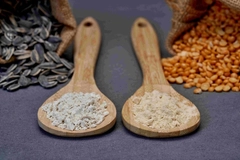
- Industry news
Industry news
- Category news
Category news
- Reports
- Key trends
- Multimedia
- Journal
- Events
- Suppliers
- Home
- Industry news
Industry news
- Category news
Category news
- Reports
- Key trends
- Multimedia
- Events
- Suppliers
Study shows Burcon’s pea and sunflower protein ingredients boost plant-based cheese
Key takeaways
- Burcon’s Peazazz C pea protein and Solatein sunflower protein performed well in melt, stretch, taste, and texture, closely mimicking traditional dairy cheese.
- Both proteins are over 90% pure, non-GMO, hypoallergenic, and sourced sustainably.
- The study validates Burcon’s technology as a game-changer for plant-based cheese, offering functional and sensory qualities previously considered difficult to achieve without dairy.
Plant-based cheese has been criticized over the last few years because often it doesn’t have the same taste sensation, mouthfeel, melting and functional properties consumers associate with traditional dairy cheeses. But a new study has shown that Burcon’s PeazazzC pea protein and Solatein sunflower protein significantly outperformed a leading competitor’s pea protein in a plant-based cheese application.
According to Burcon, a global technology firm in plant-based protein innovation, the University of Guelph research evaluated the company’s Peazazz C pea protein isolate and Solatein sunflower protein isolate in a plant-based cheese formulation.
In both objective texture analysis (cold hardness, shred efficacy, melting, and stretch) and sensory evaluation (taste, aroma, and color), Burcon’s proteins showed “a superior plant-based cheese with sensory and functional properties similar to dairy cheese.”

Peazazz C is a 90%+ purity pea protein isolate with low sodium and an exceptional taste profile. Solatein is a 90%+ sunflower protein isolate featuring a neutral flavor, off-white color, and outstanding functional properties.
It can be used across a range of food applications, particularly those requiring delicate flavors. This product — which was launched at the start of 2025 — offers an alternative protein source with over 90% protein purity, supporting the growing demand for plant-based and sustainable food options.
Both proteins are clean label, hypoallergenic, non-GMO, and processed from sustainably sourced crops.
“Burcon’s pea protein outperformed all other commercial pea protein isolates currently available for plant-based cheese production,” says Dr. Alejandro G. Marangoni, Professor and Tier 1 Canada Research Chair in Food, Health and Aging at the University of Guelph, Canada.
“It delivered the desired stretch, melt, oil binding, and shredability expected of a commercial mozzarella-style cheese, while maintaining a very clean and mild flavor that does not interfere with the flavor profile of the plant-based cheese. It is truly an exceptional ingredient.”
“This outcome is a powerful validation of our technology platform,” adds Kip Underwood, Burcon’s CEO. “Achieving dairy-like melt and stretch has long been the holy grail of plant-based innovation. These results confirm that Burcon’s proteins set a new standard for functionality, unlocking new commercial opportunities across the dairy-alternative market.”
The study closely follows Burcon NutraScience Corporation’s launch of FavaPro, a high-purity fava bean protein isolate in August. The new ingredient contains over 90% protein and is designed to support the growing demand for clean label, allergen-friendly plant proteins in applications ranging from dairy alternatives and beverages to baked goods and snacks.











